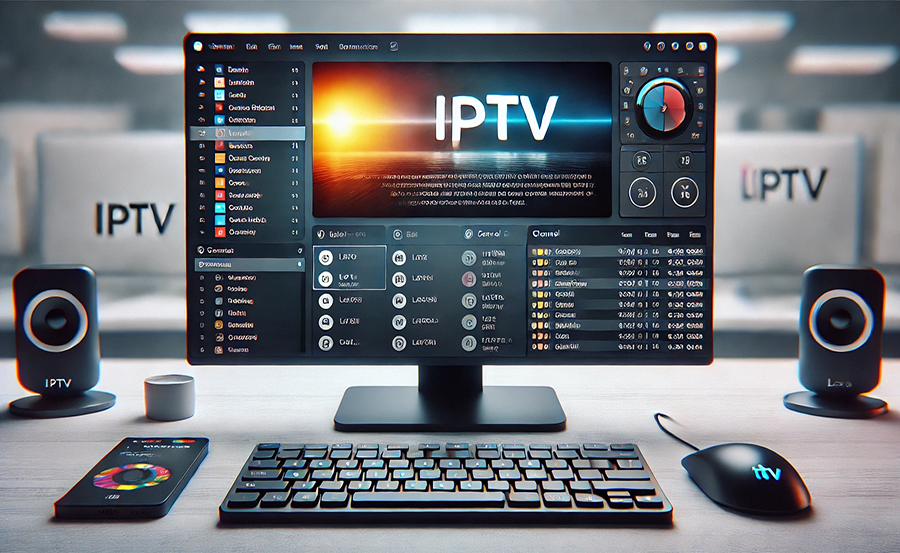In our rapidly advancing technological world, the way we consume content has dramatically transformed. The days of classic television services are slowly fading, giving rise to modern solutions like IPTV—Internet Protocol Television—which offers a more customizable and flexible viewing experience. Among the various operating systems, Linux stands out as a popular choice for many IPTV enthusiasts due to its stability and open-source nature. However, with innovation comes the inevitable brush with legality, especially when it involves media distribution over the Internet. This article aims to unravel the legal intricacies surrounding IPTV on Linux, helping you navigate this terrain with confidence.
Buy 1 Year IPTV Subscription and Enjoy Unlimited Content
What is IPTV and Why Linux?
The Basics of IPTV
IPTV essentially refers to the delivery of television content over Internet Protocol networks. Unlike traditional terrestrial, satellite signal, or cable television formats, IPTV manages to carve out a niche by allowing the streaming of media directly from the source to the user. It’s a bit like Netflix or Hulu, but with a potentially vast, uncapped array of channels from around the globe. Users can instantly access their preferred shows on various devices without being bound by geographical or infrastructural limitations.
However, this flexibility comes with its challenges. The legality of the content being streamed varies from region to region, creating complex legal conundrums. This brings us to our next point, why Linux is often the OS of choice for IPTV enthusiasts.
Smart Advice:
Secure your entertainment for a full year with a 1 Year IPTV Subscription, offering uninterrupted access to live TV.
Choosing Linux for IPTV
Linux, quite frankly, offers a plethora of advantages for users in the IPTV realm. People choose Linux not only for its open-source nature but also for its robustness, security, and flexibility. Many IPTV applications, like Smarters IPTV, run seamlessly on Linux, allowing users to switch effortlessly between channels without glitching or buffering issues. Besides, Linux users often enjoy a superior level of control over their IPTV service, adjusting settings and configurations to suit personal preferences.
Notably, IPTV for international channels is made easier and more secure by the inherent properties of Linux systems. However, while the technical perks are evident, it’s crucial to take a closer look at the associated legal considerations.
Legal Considerations for Using IPTV on Linux
Understanding Copyright Laws
The concept of copyright has been a game-changer in the IPTV industry. At its core, copyright governs the use of content, ensuring creators have exclusive rights to their work. With IPTV, many users unknowingly fall into legal gray zones by streaming content without obtaining the necessary permissions. Understanding that these legal restrictions vary vastly from one location to another is vital.
Users must comprehend that merely accessing IPTV services on Linux doesn’t exempt them from adherence to copyright laws. It is essential for Linux IPTV users to verify the legality of the channels and content they consume. While many legitimate services license content from rightful copyright holders, there are those that don’t, and the liabilities can trickle down to the end-user.
IPTV Services: Legal vs. Illegal
Within the IPTV spectrum, distinguishing between legal and illegal services isn’t always straightforward. A legal IPTV provider licenses the content they distribute, ensuring compliance with intellectual property laws. Services like legitimized Smarters IPTV pay entities for broadcast rights, assuring users of the legality of the channels offered.
Conversely, illegal IPTV services often bypass these legalities, offering thousands of premium channels without proper licensing. Such services are notoriously challenging to regulate, leading to an ever-present risk for users who might inadvertently engage with these illicit platforms. To redefine your IPTV watching experience legally, it’s crucial to engage with known and verified providers.
Potential Legal Implications and Risks
For the Average User
Legal risks associated with IPTV usage on Linux can be significant yet often underestimated. A typical user might think of themselves as a faceless entity in the vast world of the internet, but authorities have enhanced capabilities to track illegal streaming activities. Ils may face fines, lawsuits, or even service suspension if found accessing unauthorized channels. Indeed, the digital footprint left on Linux systems can be leveraged to pinpoint and penalize infringing users.
Therefore, staying informed and opting for recognized IPTV services becomes not just beneficial but a necessity. Engaging with licensed platforms ensures a safe, uninterrupted streaming journey for users who wish to stay on the right side of the law.
For IPTV Service Providers
The implications expand further when looking at IPTV service providers. Providers risk severe legal action if they distribute content without securing proper licenses. The line between legal and illegal operations isn’t blurred for operators; it is a distinct boundary that must be respected.
Providers need to navigate an intricate array of international and local laws to operate legally. More importantly, they must continuously update their licensing portfolio as new content or channels are added, making compliance a multi-faceted challenge. Successful providers maintain transparent relationships with content creators, ensuring all parties benefit fairly from the commercial arrangements.
Navigating Legal Intricacies: Best Practices
Due Diligence for Users
For a user keen on IPTV via Linux, it’s a matter of diligent research and informed decision-making. Before committing to any IPTV provider, verifying their licensing agreements and reading terms and conditions comprehensively should be your first step. Media consumption should not be a legal gamble; users need to become proactive in verifying the authenticity and legality of providers.
Additionally, engaging with forums and community discussions centered around IPTV on Linux can furnish real-world insights on reputable services. Such vibrant communities often share experiences and reviews, enabling newcomers to make educated decisions guided by collective wisdom.
Strategic Decisions for Providers
IPTV providers, keen on maintaining a reputable status, must ensure compliance by conducting regular audits. Engaging with media law experts to understand fluctuating legal dynamics is crucial. These strategic decisions ultimately serve to protect the providers’ operations and, by extension, their customers.
Offering education resources for users about legal IPTV consumption could also enhance goodwill and trust. Providers who prioritize transparency and legality not only shield themselves from legal repercussions but can also attract a more discerning, loyal customer base.
Future of IPTV on Linux: Legal Prognosis
Technological and Legal Innovations
Technology and law often dance a complicated waltz, each influencing the other in profound ways. The future of IPTV on Linux is set to witness both technological advancement and profound legal evolution. With technology incrementally edging towards a more connected and accessible form, legal structures will undoubtedly evolve to address emerging challenges.
IPTV developers and Linux communities should anticipate regulatory enhancements aimed at curbing illegal streams while fostering innovation. As demand for international channels grows, Smarters IPTV and similar services need to adapt and align with legal prerequisites to redefine the IPTV watching experience comprehensively.
Leadership and Advocacy
Leadership within the IPTV community will play an instrumental role in guiding both users and policymakers. Intellectual property rights are expected to gain broader definitions, urging community voices to advocate for balanced reforms that promote lawful content distribution while safeguarding consumer rights.
As the legal canvas undergoes changes, leadership will hinge on transparent practices, consumer education, and persistent advocacy for fair content distribution frameworks. This concerted effort can bridge gaps between technological capability and legal conformity.
Ever-Evolving Legal Frameworks and Implications
Keeping Abreast with Legal Changes
The IPTV landscape is dynamic, not static; hence, staying informed about ongoing legal updates is pivotal for both users and providers on Linux platforms. Various jurisdictions may introduce amendments and regulations that can critically affect how IPTV services are operated and consumed.
Subscribing to legal newsletters, joining professional networks, or consulting with attorneys specializing in media laws are practical ways to stay updated. Developing an understanding of local regulatory environments, especially regarding copyright, can prepare stakeholders to engage confidently.
The Role of Community and Support
Communities that form around IPTV services on platforms such as Linux can be invaluable sources for news, updates, and support. Forums, discussion groups, and social media platforms are often abuzz with the latest legal news and user experiences.
However, relying solely on lay opinions isn’t advisable. Using these platforms as supplementary resources, rather than sole sources, ensures that users and providers make informed and legally sound decisions.
Questions You Might Have Answered

How do I ensure my IPTV usage on Linux stays legally compliant?
To ensure compliance, always choose reputable IPTV providers who have the necessary licenses for the content they offer. Conduct thorough research and read terms and conditions to ascertain that the service adheres to regional and international laws.
Can using an illegal IPTV service on Linux get me into legal trouble?
Yes, using illegal IPTV services can lead to personal legal issues, including fines or even criminal charges. Authorities worldwide are increasing their efforts to curb illegal streaming, making it imperative for users to avoid unauthorized services.
What steps should IPTV providers take to remain lawful?
Providers need to secure proper licensing agreements with content creators and continuously review legal shifts affecting IPTV distribution. Regular audits and consultations with legal experts can help them stay ahead of regulatory requirements.
What are the risks of using unauthorized IPTV services?
Risks include legal penalties, as well as loss of service and potential privacy breaches. Unauthorized services often lack the security measures legitimate services implement, exposing users to various cybersecurity threats.
How does Linux enhance IPTV experience compared to other operating systems?
Linux offers stability and significant control over IPTV applications, allowing for customized settings and improved performance. Additionally, it’s often seen as more secure, reducing vulnerabilities that may be exploited on other operating systems.
Are there reliable resources to learn about IPTV laws and updates?
Yes, legal newsletters, media law blogs, and consultations with legal professionals specializing in technology and media can be valuable. Joining community forums and participating in discussions can also provide insights into current legal trends and concerns.
Charting Your IPTV Course on Linux
As you navigate the alluring world of IPTV on Linux, understanding and complying with legal frameworks is paramount. While the technical aspects may beckon with promises of flexibility and control, it’s the legal navigations that ensure a peaceful, uninterrupted viewing experience. By opting for legal services and staying informed about evolving regulations, users and providers alike can enjoy the extraordinary potential IPTV offers without the specter of legal infringement. The future of IPTV on Linux, while complex, is equally promising for those willing to chart their course thoughtfully and lawfully.
Top IPTV Services for Streaming Live Cooking Shows





